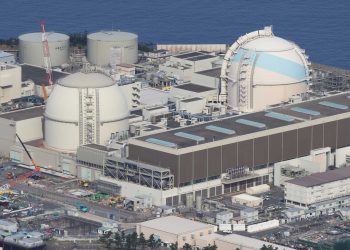Agence France-Presse,
TEHRAN: Iranian President Mahmoud Ahmadinejad ruled out on Wednesday giving “the slightest concession” in the country's nuclear standoff with the West.
He spoke as confusion emerged over a meeting between Tehran and the European Union, with an Iranian official saying it was set for next week and EU foreign policy chief Javier Solana's spokeswoman saying no date had yet been decided.
Ahmadinejad's remarks were the latest sign his government has no intention of suspending uranium enrichment, the key sticking point between Iran and world powers in the nuclear crisis.
“They (the enemies) must know that Iran will not give the slightest concession … to any power,” Ahmadinejad said in a speech broadcast live on state television.
“If they manage to take even a small concession from us, they will later seek other concessions by making threats,” he said during a trip to the northern province of Ardebil.
Meanwhile, it was announced in Tehran that a meeting between top Iranian nuclear negotiator Saeed Jalili and Solana is to take place on November 30 in London, Jalili deputy Javad Vaidi said.
“This afternoon I talked to (top Solana aide) Robert Cooper and we finalised the venue and the date of the meeting between Solana and Jalili,” Vaidi said.
“It was agreed that the meeting take place on November 30 in London.”
In Brussels, however, Solana spokeswoman Cristina Gallach said there was “still nothing” and “no date” for any meeting.
Earlier Wednesday, Solana had expressed doubts whether the meeting could take place in the next two weeks.
“I have been in contact with them (the Iranians). I don't see this week because they have not offered any date. I will be at their disposal this week but it has not been possible,” he told reporters in Brussels.
“Next week will be very difficult,” he said.
Solana is due to take part in a key Middle East peace conference in the United States on Tuesday.
He must report to the UN Security Council by the end of November on Tehran's willingness to comply with the council's demand to freeze uranium enrichment, a potential bomb-making process.
He has tried to persuade Tehran to resume talks on suspending uranium enrichment in exchange for a package of political and economic incentives but Tehran has refused to offer concessions.
Last month, Ahmadinejad replaced then nuclear negotiator Ali Larijani with Jalili, a move interpreted as aiming to increase the president's control in the nuclear talks.
Iran has already had two sets of UN sanctions imposed on it over the issue.
“We believe that nuclear energy is our nation's right and today this energy is at our disposal,” Ahmadinejad said. “No one can take it from us.”
Washington accuses Tehran of using its programme as cover for a drive to develop an atomic bomb. Iran strongly denies that charge, saying it wants only to generate electricity.
Tehran forged an August agreement with the UN nuclear watchdog, the International Atomic Energy Agency, to examine outstanding issues in its atomic activities, including uranium-enriching centrifuges.
The IAEA report of November 15 said Iran had taken important steps in revealing the extent of its nuclear drive but was still defying UN demands that it suspend uranium enrichment.
The IAEA said it would focus on the contamination issue in the next few weeks as well as studies and activities that the West fears could have military applications.
Iran's refusal to halt enrichment has angered Western powers led by the United States, which has been pushing for a third UN Security Council resolution imposing sanctions on Tehran.
The White House has vowed to seek further UN sanctions on Tehran, while never ruling out military action if Iran persists with its nuclear programme.
“We have many times said that the nuclear issue has ended from our point of view,” a defiant Ahmadinejad said.









